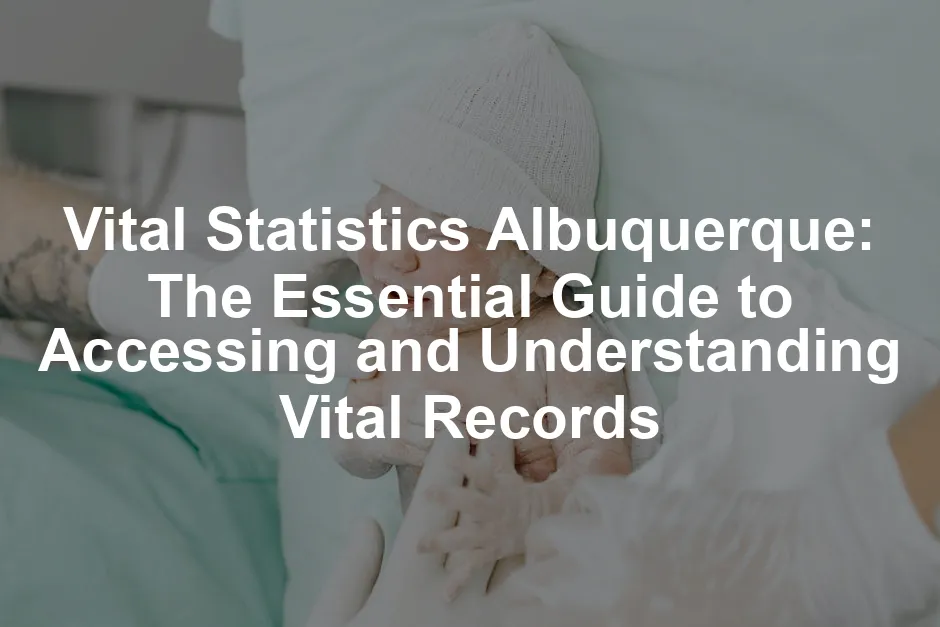Introduction
In a world where everyone seems to be in endless pursuit of their heritage, vital statistics often hold the key to our roots. Whether you’re tracing your ancestry, obtaining a marriage license, or simply curious about the demographic trends in Albuquerque, understanding how to navigate the vital statistics landscape is essential.
Imagine sifting through a treasure trove of records that reveal the stories of our past. Birth and death certificates are like breadcrumbs leading us back to our ancestors. They tell tales of love, loss, and everything in between. But it’s not just about personal history; these records are vital for legal matters too. Need to prove your identity? You’ll probably need a certified copy of your birth certificate. Want to get married? You’ll need a marriage license.
This guide will take you through everything you need to know about vital statistics in Albuquerque. From obtaining birth and death certificates to exploring the wealth of genealogical resources available, you’ll be equipped with the knowledge to unearth the data you need.
Buckle up, because we’re about to embark on an enlightening journey into the often-overlooked world of numbers and records. These vital statistics may seem mundane, but they paint a rich tapestry of our community and its history. Whether you’re a curious soul or a dedicated genealogist, this guide will illuminate the path to understanding Albuquerque’s vital records.
So grab your magnifying glass—metaphorically, of course—and let’s dive into the data that carries the stories of our lives! You’ll soon discover that these records are not just dry documents; they’re vibrant snapshots of the people and events that have shaped our city. Get ready to unlock the secrets of Albuquerque’s vital statistics like a pro!

Understanding Vital Statistics
What Are Vital Records?
Vital records are official documents capturing life events. They include birth, death, marriage, and divorce certificates. Each type serves a unique purpose and carries significant weight in various contexts.
Birth certificates record an individual’s entry into the world. They provide essential details like name, birth date, and parentage. A marriage certificate confirms the union between partners, while a divorce certificate marks the end of that union. Death certificates are crucial for confirming a person’s passing and for legal matters that follow.
The significance of these records stretches beyond mere documentation. In legal scenarios, they verify identity and relationships. Need to obtain a passport? You’ll require your birth certificate. Want to settle an estate? A death certificate is a must. And to keep your important documents safe, consider a stylish Birth Certificate Holder to protect your precious records!
In medical contexts, these records help track health trends. Birth and death statistics contribute to research on maternal health and mortality rates. For genealogists, they’re gold mines, providing insights into family trees and ancestral connections.

Importance of Vital Statistics
Vital statistics don’t just sit in dusty archives. They play a pivotal role in public health reporting and resource allocation. Governments use this data to identify health trends and needs in the community. For instance, rising birth rates in Albuquerque might prompt increased funding for maternal health services.
Demographic patterns emerge from these statistics, shedding light on the community’s makeup. Are more people moving to Albuquerque? Are we seeing a surge in elderly residents? These trends help city planners and health officials make informed decisions.
Public health reports derived from vital statistics are essential for monitoring the community’s well-being. Tracking mortality rates, for example, helps identify potential health crises or areas needing intervention. In short, vital statistics are the backbone of community health initiatives.
Legal Restrictions
Now, before you rush to grab those vital records, let’s talk access. Not everyone can waltz in and request a certificate. Legal constraints often limit access to immediate family members or those with a legal interest in the record.
To access a birth or death certificate, you need to verify your identity. This might involve providing government-issued ID or other documents proving your relationship to the registrant. The New Mexico Bureau of Vital Records enforces these restrictions to protect privacy.
For instance, a sibling can request a birth certificate, but a distant cousin? Not so much. Understanding these legal limitations is crucial for anyone looking to access vital records.
In summary, vital records are essential documents that tell the story of our lives. They have legal, medical, and genealogical significance. Knowing their importance and the restrictions surrounding them will empower you in your quest for information.

Accessing Vital Records in Albuquerque
When it comes to vital records in Albuquerque, the process may seem daunting. Not to worry! We’ll walk you through everything from obtaining birth certificates to navigating marriage and divorce records. Let’s get started!
Birth Certificates
How to Obtain
To request a birth certificate in Albuquerque, follow these steps:
- Eligibility: Only immediate family members can apply. This includes parents, siblings, children, and legal representatives.
- Gather Required Documents: Prepare a valid government-issued ID. This could be a driver’s license or passport. Also, have a completed application form ready, which you can find on the New Mexico Department of Health website.
- Choose Your Request Method: You can request a birth certificate in person, by mail, or online. If you’re feeling tech-savvy, use VitalChek, an online service authorized by the state for expedited requests.
- Payment: The cost for a certified birth certificate is $10. If mailing your request, include a check or money order made out to the New Mexico Vital Records.
- Processing Time: Expect your certificate to arrive within 3-5 business days if you opt for regular mail. If you choose expedited service via VitalChek, it can arrive even quicker.
- Visit Local Offices: You can also visit various Public Health Offices across Albuquerque, which can issue birth certificates on-site. Just remember to call ahead and confirm their availability!

Death Certificates
How to Obtain
Obtaining a death certificate has its own set of rules. Here’s what you need to know:
- Eligibility: Access is typically restricted to immediate family members or individuals with legal interest. This means you’ll need to prove your relationship to the deceased.
- Request Process: To request a death certificate, you can apply online, by mail, or in person at the New Mexico Vital Records office.
- Required Documents: Besides your ID, you’ll need the deceased’s details, such as full name, date of birth, and date of death.
- Fees: The cost for a death certificate is $5 for the first copy, and $5 for each additional copy.
- Processing Time: Similar to birth certificates, processing takes about 3-5 business days for standard requests. If you’re in a hurry, online options may speed up the process.

Marriage and Divorce Records
How to Obtain
Marriage licenses and divorce decrees can be equally essential. Here’s how to get them:
- Marriage Licenses: To obtain a marriage license, head to the Bernalillo County Clerk’s office. Bring valid ID and pay the fee, which varies by county. The process is usually quick, and you can get married the same day!
- Divorce Decrees: For divorce records, contact the district court where the divorce was filed. You’ll need to provide details like the names of both parties and the date of the divorce.
- Legal Standing: Keep in mind that access to these records isn’t as open as you might hope; only individuals involved in the marriage or divorce can request copies.
- Fees: Costs vary by the type of record and where you obtain it. Always check with the specific office for the exact amount.
The New Mexico Bureau of Vital Records and Health Statistics provides a variety of services beyond just birth and death certificates. Here are some notable offerings:
- Acknowledgment of Paternity: This important service helps establish legal fatherhood when parents are not married.
- Gender Designation Change: Since legislation passed in 2019, individuals can update their gender on birth certificates. This process requires specific documentation, so check the requirements carefully.
- Delayed Birth Registration: If you missed registering a birth, you can still do so! This service helps individuals who were born but never had their birth recorded timely.
- Putative Father Registry: A unique service aimed at protecting the rights of fathers who may not have been married to the mother.
Accessing vital records in Albuquerque doesn’t have to be a Herculean task. Armed with the right information and documents, you can navigate the process smoothly. Whether you’re securing a birth certificate for a child or a marriage license for your big day, the essential services are right at your fingertips. So why wait? Start your journey today!

Genealogical Resources in Albuquerque
Libraries and Research Centers
If you’re on a quest to unlock your family history, the Genealogy Center at the Albuquerque Public Library is your golden ticket. This hub is a treasure trove for anyone interested in genealogy and vital statistics. They offer an impressive collection of resources tailored for research enthusiasts.
At the Genealogy Center, you’ll find a wealth of online databases. These include vital records, census data, and more, helping you piece together your family’s story. Need print materials? No problem! The center has extensive print collections on-site. From local history books to family trees, you’ll be hard-pressed to leave empty-handed.
But wait, there’s more! The center also provides access to microform collections, including church records and obituaries. These can be particularly useful for tracking down elusive ancestors. Plus, the knowledgeable staff is always ready to assist. They can guide you through the myriad resources, ensuring you make the most of your research time.
If you’re serious about genealogy, consider investing in Genealogy Software for Windows. This software will help you organize your findings and create stunning family trees with ease!

Online Resources
In today’s digital age, online resources play a crucial role in genealogical research. Websites like FamilySearch: The Official Guide and AncestryDNA: Genetic Ethnicity Test are invaluable for anyone looking to trace their roots. These platforms offer extensive databases filled with birth, marriage, and death records, along with census data and military records.
To use these resources effectively, start by creating a free account on these sites. Once registered, you can search records using your ancestors’ names, birth dates, and locations. Don’t forget to check out the various indexes available. They can save you time and narrow your search down significantly.
FamilySearch, in particular, has a fantastic collection of free records. You can access New Mexico’s vital records and more without breaking the bank. Ancestry.com, while subscription-based, often offers free trials. So, if you’re feeling adventurous, why not take advantage of these offers?
When using these databases, remember to take notes! Document your findings and save copies of important records. This will help you keep track of your research and avoid duplicating efforts. With a bit of patience and organization, you’ll uncover fascinating details about your family tree.

Local Organizations
Albuquerque boasts several local organizations dedicated to assisting with genealogical research. One noteworthy group is the New Mexico Genealogical Society. They provide valuable resources, including workshops, newsletters, and a supportive community of fellow researchers. You can reach them through their website or attend one of their meetings to connect with like-minded individuals.
Another fantastic resource is the Albuquerque Genealogical Society. They host regular meetings, presentations, and special events focusing on different aspects of genealogy. Their members are often well-versed in various research techniques and can offer guidance on overcoming research hurdles.
For those seeking help with specific records or historical contexts, the Historical Society of New Mexico is a great option. They provide access to archives, libraries, and research facilities that can enhance your search.
If you’re eager to get involved, these organizations often welcome volunteers. You can contribute your time and skills while learning more about genealogical research. Contact them via their websites or social media pages for information on how to get started.

Public Health Statistics and Their Relevance
Overview of Public Health Statistics
Public health statistics are the backbone of community health planning and response. They provide critical insights into the health status of a population and help identify trends over time. In Albuquerque, these statistics are used to enhance community welfare and improve public health initiatives.
Health data collected from vital statistics, such as birth and death rates, help officials understand the demographic landscape. For instance, a spike in birth rates might indicate the need for additional maternal health services. Similarly, rising mortality rates can signal emerging health crises, prompting preventive measures.
Albuquerque employs this data to monitor community health trends actively. By analyzing statistics, local health departments can allocate resources effectively. This ensures that healthcare services meet the needs of the population, promoting better health outcomes for all residents.
Decisions based on public health statistics help shape policies related to various issues, including maternal and child health, chronic disease prevention, and emergency preparedness. So, the next time you hear about health statistics in Albuquerque, remember: they’re not just numbers. They’re vital tools for improving the community’s overall health and well-being.

Analysis of Trends
Albuquerque’s health statistics reveal intriguing trends in birth and death rates. Recent data shows a slight uptick in birth rates, with more families choosing to settle in the area. This rise suggests a growing population, which may lead to increased demand for services such as schools and healthcare.
Conversely, the death rate has experienced fluctuations. Factors like an aging population and chronic health conditions contribute to this trend. Public health officials stress the importance of addressing these issues through community health initiatives.
One significant finding is the impact of socio-economic factors on health outcomes. Areas with higher poverty rates often see increased mortality rates, highlighting the need for targeted public health strategies. This data can help policymakers allocate resources effectively to improve overall community health.
The implications for public policy are profound. With the birth rate increasing, local governments may need to invest in maternity and pediatric services. Conversely, a rising death rate necessitates enhanced support for elderly care and chronic disease management.
By understanding these trends, Albuquerque can foster a healthier community, ensuring resources meet the evolving needs of its residents. Addressing these statistics is not just about numbers; it’s about shaping policies that enhance lives.
In summary, the trends in Albuquerque’s vital statistics underline the interconnectedness of health data and public policy. As the city evolves, so too must its strategies to support a thriving, healthy population.

Conclusion
In conclusion, vital statistics in Albuquerque are not just numbers; they represent the stories of individuals and families that shape our community. By understanding how to access and utilize these records, residents can trace their heritage, navigate legal requirements, and contribute to public health data. Whether you’re looking to obtain a vital record for personal reasons or conduct broader research, the information provided in this guide is your roadmap to success.
Vital records are invaluable tools. They shed light on our past while guiding our future. Each birth certificate marks a new life, a new story. Each death certificate reflects a life lived, a legacy left behind. Understanding these records is crucial for anyone interested in their family history.
Albuquerque offers resources to help you navigate this landscape. From local public health offices to genealogy centers, the information is accessible. Being informed empowers residents to make educated decisions about their health and heritage.
Moreover, the records hold significance beyond personal needs. They contribute to public health data, helping officials respond to changing demographics. The community can thrive when everyone has access to accurate information.
So, whether you’re a history buff, a researcher, or someone needing a vital record, this guide has equipped you with the tools to succeed. Don’t hesitate to reach out to local offices for assistance. They are here to help you on this journey.
By actively engaging with Albuquerque’s vital statistics, residents can contribute to a richer narrative about their community. Let these records illuminate your path, guiding you toward understanding your roots and shaping your future.

Frequently Asked Questions
For those interested in learning more about accessing vital records in Albuquerque, check out this resource for an introduction to statistical learning with Python and understanding book length.
How can I obtain a birth certificate in Albuquerque?
To obtain a birth certificate in Albuquerque, you must be an immediate family member. Follow these steps: 1. Gather necessary documents, including a government-issued ID. 2. Complete the application form available on the New Mexico Department of Health website. 3. Request the certificate online through VitalChek, by mail, or in person at a local public health office. 4. Pay the $10 fee for the certificate. 5. Expect processing to take 3-5 business days.
Are death certificates available online?
Yes, death certificates can be ordered online. You can use the VitalChek service for expedited requests. However, access is limited to immediate family members or those with legal interest in the record.
What is the cost of obtaining vital records?
The costs for obtaining vital records in New Mexico are as follows: – Birth Certificate: $10 for the first copy. – Death Certificate: $5 for the first copy. Additional copies of each record are available for the same price.
How do I change my gender designation on my birth certificate?
To change your gender designation, submit a request form to the New Mexico Bureau of Vital Records. Include documentation supporting your request. For more details, visit the New Mexico Department of Health’s website.
Where can I find genealogical resources in Albuquerque?
Albuquerque offers various genealogical resources, including: – The Genealogy Center at Albuquerque Public Library. – Online databases like FamilySearch and Ancestry.com. – Local organizations such as the New Mexico Genealogical Society.
How are public health statistics collected and reported?
Public health statistics are collected through vital records, surveys, and health department data. This information is analyzed and reported to monitor community health trends and support public health initiatives. By understanding these statistics, officials can allocate resources effectively and address health needs in Albuquerque.
Please let us know what you think about our content by leaving a comment down below!
Thank you for reading till here 🙂
All images from Pexels




